Tag: United States
Smoke and mirrors make confusion, not peace

According to EU High Representative Borrell, Saturday’s meeting between Serbian President Vucic and Kosovo Prime Minister Kurti was a success. It resulted in an “Implementation Annex” to the Agreement on the Path to Normalisation of Relations. There are two macro problems:
- It is focused on process, not substance.
- Serbia again refused to sign.
Process not substance
The major procedural innovation is incorporation of the obligations in the two agreements into both country’s EU accession obligations. The new agreement also foresees an EU-chaired monitoring group. These provisions have been implicit all along. They obligate the EU more than they obligate Serbia and Kosovo. Moreover, the obligation does not extend to recognition of Kosovo’s sovereignty and territorial integrity, since the normalization agreement falls short of that benchmark.
The implementation annex also obligates Pristina to begin negotiations “immediately” on self-management for the Serbian community in Kosovo. This reformulation of the 2013 agreement to create an Association of Serb-majority Municipalities has two notable features:
First: it avoids the specific institutional form of the original. That in Pristina’s eyes represented a potential threat to Kosovo’s sovereignty and territorial integrity.
Second: it references the “Serbian community.” This suggest it applies not to existing municipalities but rather only to those inside Kosovo who consider themselves Serbian citizens.
The first is clearly to Kosovo’s advantage. The second is to Serbia’s, since it eliminates obligations to most non-Serbs.
The new agreement adds other procedural niceties. The obligations of the original agreement are to be implemented independent of others and the order in which they are mentioned. None are to be blocked. All that is good.
No signatures
Once again, President Vucic refused to sign the agreement. Vucic’s motives are clear. He fears domestic reaction in Serbia, where ethnic nationalist passions and hatred of Albanians reign supreme. He wants to avoid any formal equality with someone who will insist on being identified as the Prime Minister of the (independent and sovereign) Republic of Kosovo (or maybe even Kosova, the Albanian preference).
EU and US officials would have you believe this does not matter. But it does. Under international law, signed agreements obligate a state. Unsigned ones do not. Serbia could walk away from all the agreements with Kosovo, as they are unsigned. In fact, it has not implemented many. Nor has Kosovo. Signatures would make a big difference. That is why Vucic resists.
The Americans and Europeans have pressed Kurti hard to obligate Kosovo. They have withheld goodies and criticized him publicly. It shows. He is willing to sign.
Brussels and Washington have taken a different approach with Vucic. It also shows. They have rewarded him in advance. Neither criticizes Serbia’s drift towards autocracy or its corruption. Both welcome Vucic and his minions for visits and provide ample assistance, including more than one billion recently for railroad reconstruction. This appeasement gives him the diplomatic space he needs for refusal to sign. Even the donor conference promised in the more recent agreement is of marginal interest, as Serbia has most of what it wants already.
What is missing
We always need to ask “what is missing?” That is often more significant in assessing a diplomatic maneuver than what is apparent. Here are a few missing elements:
- There is no reciprocity. Serbia gets its “self governance” for its citizens in Kosovo but the Albanians who live in southern Serbia do not get anything comparable.
- Serbia’s harassment of Serbs who participate in Kosovo institutions is not mentioned. This includes municipal governments as well as the Pristina institutions, including the Kosovo Security Force.
- There are no deadlines to accomplish the goals set out. An implementation agreement is only as good as its timetable.
- While a signature on this agreement might amount to virtual recognition, that possibility is not mentioned, even as a remote goal. Nor is there any sign of recognition by the five EU non-recogniers.
A process-focused agreement without signatures leaves a lot to future negotiations. This one is more smoke and mirrors than substance. It is more likely to generate further confusion than peace.
The easy way out leads to failure
I spoke yesterday at a US-Europe Alliance panel on the impact of the Russian invasion of Ukraine in the Western Balkans. Here are my notes:
Let me start by making three point I regard as obvious:
- Russian military aggression in Ukraine has a counterpart in the Balkans There the aggression is via hybrid warfare directed from Serbia, mainly against Kosovo, Bosnia and Herzegovina, Montenegro, and Macedonia.
- If Russia succeeds in gaining territory in Ukraine, we should expect a far more aggressive effort in the Balkans.
- If Russia fails in Ukraine, it will fail as well in the Balkans.
Why?
Why then, you should ask, has the State Department been so soft on Serbia, Russia’s main agent in the Balkans? The US has allowed billions of dollars of development bank investments to go to Belgrade. The Pentagon is trying to revive military cooperation with the Serbian army. The State Department backed unproductive and unjustified decisions by the HiRep in Bosnia that favored Croat extremists and sanctioned Serbs. American officials befriended and encouraged a narrowly elected pro-Russian government in Montenegro. They have insisted on early formation of an Association of Serb-majority Municipalities in Kosovo, a proposition that would weaken the still young Kosovo state.
Some regard these moves as recent. But they are better regarded as part of a long history of taking the easy way out in the Balkans. As difficult as they were, the Dayton accords seemed easier to Washington in 1995 than defeat of Republika Srpska. After Milosevic fell to the 2000 election in Serbia, the Americans quickly gave unequivocal support to his successors. They cut off funding to the Otpor Resistance movement that intended to keep a sharp eye on the democratization process. Senator Biden argued in a hearing several years later that it would be better to get Serbia into the EU accession process than to insist it earn candidacy on the merits.
Serbia’s response
The Serbian government took advantage of that support to reject the Ahtisaari plan for Kosovo’s independence. It instead established Serbia as a militarily “neutral” country. Belgrade rearmed as best it could, mainly with Russian help. When Serbia’s disappointing but relatively liberal “democrats” lost the 2012 election, Washington lined up behind their nationalist successors.
Many thought they could be convinced to resolve the Kosovo issue in a “Nixon to China” move. Presidents Nikolic and then Vucic declined to do so. President Vucic’s minions now talk openly about a “Serbian world.” That is analogous to Vladimir Putin’s “Russian world” and a synonym of Greater Serbia. It is only a matter of time before Serbia walks away from the French-German proposed agreement that Vucic refused to sign last month.
Washington however has been unresponsive and ineffective. Vucic’s unwillingness to sign, Republika Srpska’s “national day” display of force, Belgrade’s threats of military action in Kosovo, the Bosnia HiRep’s decision to change the way votes are counted the day after an election, the compromise of NATO secrets by Montenegro’s pro-Russian government, control of the press, harassment of liberal democrats, and corruption in Serbia—none of these developments have elicited an effective response from Washington.
Unedifying
The explanation is far less than edifying. Washington doesn’t give a hoot about the Balkans. The region is too complicated, too peripheral, too aggravating. So it delegates hegemony to a “pivotal state.” The State Department thinks that is Serbia, which is central geographically, larger than its neighbors, a bit better off economically, and a far more consolidated state than the other former Yugoslav republics.
If you delegate a pivotal state to control a region, you have to put up with most of its behavior, both in the region and at home. If the pivotal state in addition maintains good relations with your adversaries, you will fear a tilt in that direction. Hence the US government’s reluctance to call out Belgrade, even when it sides with Moscow and Beijing in foreign policy and slides inexorably toward autocracy at home.
This is a sad commentary, not only on American diplomacy. It sadly favors a Russian proxy over states truly aspiring to join the West. That’s ugly. But it is also sad for the region, which has good reason to fear instability. Bosnia, Kosovo, and Montenegro all face threats to their sovereignty and territorial integrity as a result of America’s treatment of Serbia as the pivotal state in the Balkans.
But it is sad also for Serbia, which no longer meets the Copenhagen democracy criteria for EU membership. Vucic can do what he pleases domestically, without concern about constraints on his power. And it is sad for Kyiv, which should worry that whatever the Americans agree in the Balkans they may copy in Ukraine. How about an Association of Russian-majority municipalities in Donbas?
To put it plainly: the easy way out leads to failure.
PS: Take a moment to look at Demush Shasha’s pertinent tweets from today:
Four important takeaways from today’s @freedomhouse “Freedom in the World 2023” report.
1. Kosovo is democratic trailblazer of the region. Kosovo made record annual democratic improvement and ranked as third most improved democracy in the world in 2022.
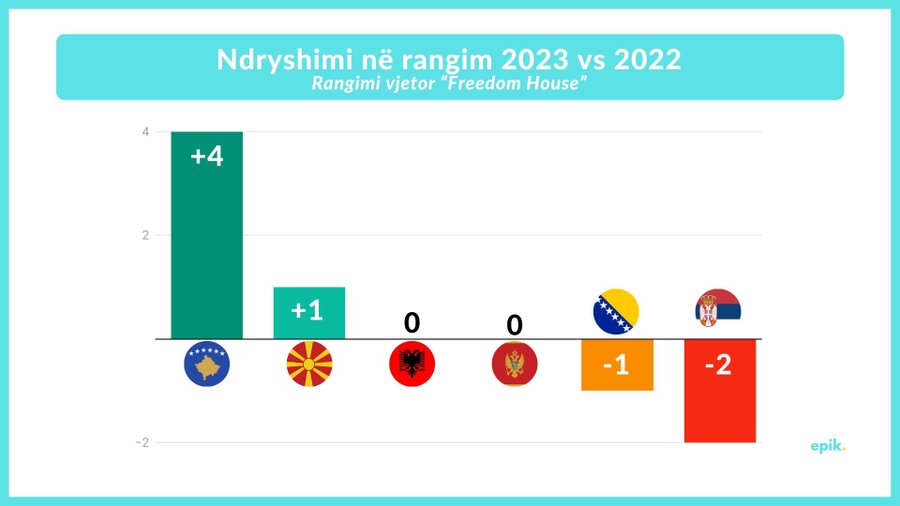
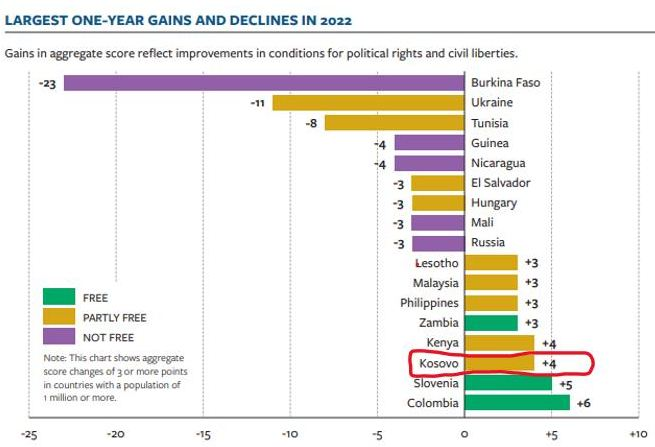
2. Kosovo and Serbia democracies are heading to totally opposite directions.
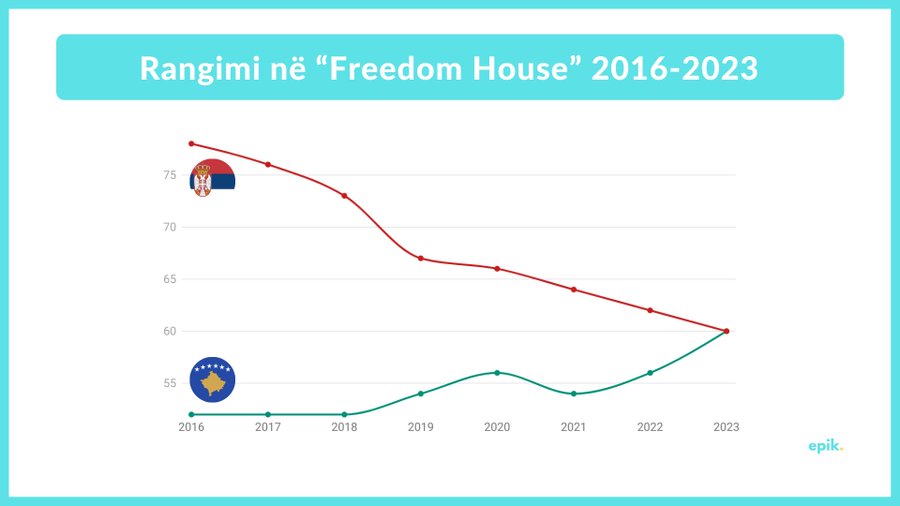
3. Looking at a longer time scale, only Kosovo and North Macedonia have today a better democracy then a decade ago. Albania has made no progress, while Serbia, Montenegro and Bosnia have worst democracies today then a decade ago.
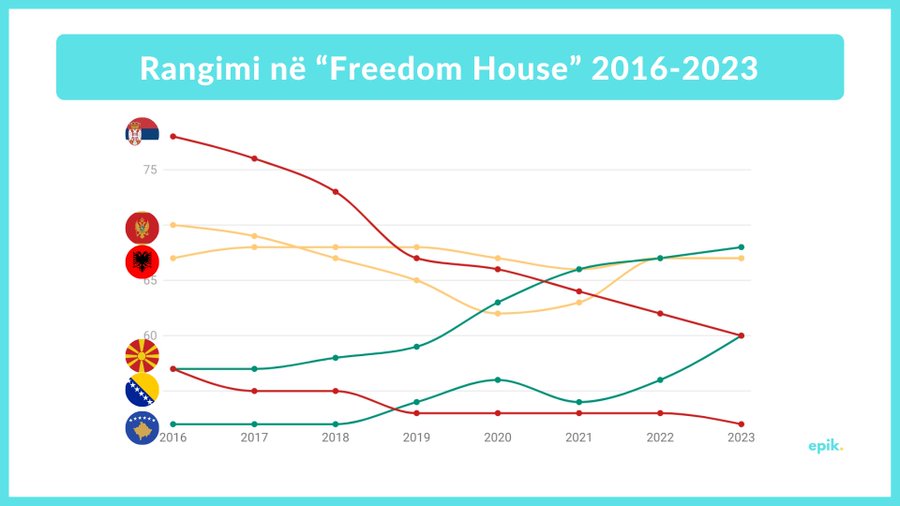
4. Serbia’s democratic collapse is in particular staggering. A decade long democratic nosedive has put it now in a category with Afghanistan and Myanmar.
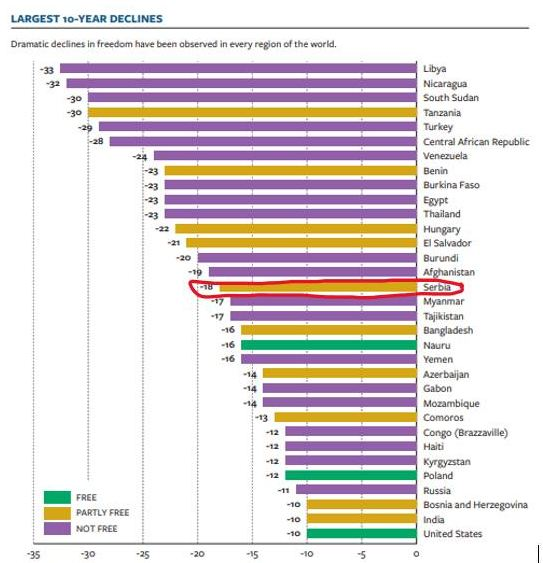
Stevenson’s army, March 7
– Atlantic cover story warns of extremist violence in US
– WSJ begins series arguing US isn’t ready for great power conflict.
– Chinese blast US — Xi himself; and the foreign minister.
– At Taipei request, McCarthy will meet Taiwanese leader in California.
–Dissent against Netanyahu in Israeli military.
– NYT magazine tells of Chinese spy operation.
– Lawfare has favorable review of new cybersecurity policy.
My SAIS colleague Charlie Stevenson distributes this almost daily news digest of foreign/defense/national security policy to “Stevenson’s army” via Googlegroups. I republish here, with occasional videos of my choice. To get Stevenson’s army by email, send a blank email (no subject or text in the body) to stevensons-army+subscribe@googlegroups.com. You’ll get an email confirming your join request. Click “Join This Group” and follow the instructions to join. Once you have joined, you can adjust your email delivery preferences (if you want every email or a digest of the emails).
Stevenson’s army, March 3
– WSJ says Germany isn’t boosting defense as promised.
– Australian think tank says China leads US is key technologies. WSJ summary.
– WSJ sees US-EU clash over Iranian nuclear programs.
– Politico’s NatSec Daily says US won’t criticize India
– FP tells how Ukraine learned to fight
– WOTR has good piece on acquisition reform.
– Politico reports on administration WMD strategy.
Off topic but significant: it’s the phones.
And for fun, look at these maps.
Put away the carrots and take out the sticks
Yesterday’s EU-hosted meeting between Serbian President Vucic and Kosovo Prime Minister Kurti ended without signature of a “normalization” agreement. That ranks as a failure, especially after months of built-up expectations. But let’s take a closer look, based on the criteria I outlined yesterday: improved state-to-state relations, reciprocity, and international engagement.
Assessing the unsigned agreement
- Improved state-to-state relations: Articles 1-2 score high in this category, as they would require recognition of each others’ sovereignty, equality, independence, territorial integrity, symbols, and documents. Article 3 would also apply the UN Charter provisions on the use and threat of force, which apply to sovereign states. Together they amount to mutual recognition as sovereign and independent states, in all but name. This is virtual recognition.
- Reciprocity: Article 4 provides that neither party can act on behalf of the other or represent the other internationally. This rates high in the reciprocity category. It also provides that Serbia will not block Kosovo’s membership “any” international organization, which presumably includes the United Nations. That is not reciprocal, but it need not be, since Kosovo has not tried to block Serbian membership. Article 5 applies mutual “non-blocking” specifically to the EU. Article 6 requires both parties to continue the dialogue with the goal of a “legally binding agreement on comprehensive normalization of their relations.” That doesn’t say mutual recognition. But it is close, especially when read in conjuntioin with Article 8 for exchange of permanent diplomatic missions.
- International engagement: Article 9 promises international financing and investment. Article 10 provides for an EU-chaired implementation committee. Article 11 provides for an implementation roadmap to be negotiated in future dialogue sessions. There is no mention of recogntion by any of the five EU nonrecognizers. Nor are there any specific financial commitments.
Not bad I’d say: maybe an 8 out of 10, if the parties had signed it. It is a shame Vucic was unwilling.
The rub
Article 7 is the rub. I quote it in full:
Both Parties commit to establish specific arrangements and guarantees, in accordance with relevant Council of Europe instruments and by drawing on existing European experiences, to ensure an appropriate level of self-management for the Serbian community in Kosovo and ability for service provision in specific areas, including the possibility for financial support by Serbia and a direct communication channel for the Serbian community to the Government of Kosovo.
The Parties shall formalise the status of the Serbian Orthodox Church in Kosovo and afford strong level of protection to the Serbian religious and cultural heritage sites, in line with existing European models.
These are non-reciprocal provisions intended to satisfy the Serb population of Kosovo, without any comparable arrangements inside Serbia. The first paragraph replaces provisions in the 2015 Brussels agreement for an Association of Serb-majority Municipalities (ASM). Instead of presuming that institutional form, it instead outlines the functions Belgrade wants from such an Association: “self-management” for the Serb community, “service provision” partly financed by Serbia, and a “direct communication channel” with the Kosovo government.
This is a major step in the right direction. There are many ways, other than an Association that could pose a threat to Kosovo’s sovereignty and territorial integrity, to meet these functional objectives.
The second paragraph requires a law on the status of the Serbian Orthodox Church, which will be controversial because of property issues but in the end doable.
Kurti yes, Vucic no, EU moves ahead, US should reevaluate
Prime Minister Kurti said he was ready to sign this agreement. It moves the dialogue in a good direction: toward recognition, toward reciprocity, away from the ASM, and toward more even-handed international engagement. President Vucic refused to sign. That puts the monkey on his own back. It also demonstrates the ineffectiveness of the many inducements he has been granted up front to get him to sign.
The EU decided to move ahead in the dialogue anyway on the basis of the unsigned agreement. This is the best they could do. Next step will be the implementation plan.
It won’t be easy to get Vucic to drop the ASM or proceed with any of the other provisions that move in Kurti’s direction. But Kosovo’s officials have an opportunity to shift the momentum of these talks on the basis of this unsigned agreement. In the meanwhile, the Americans and Europeans need to admit their appeasement strategy vis-a-vis Vucic has failed. Put away the carrots and take out the sticks.
How to assess a Pristina/Belgrade agreement
My Balkanite friends are clamoring to know what is going to happen tomorrow when Serbian President Vucic and Kosovo Prime Minister Kurti meet once again. The Europeans and Americans are pressing hard for a “normalization” agreement. No one knows quite what that means.
But I have some ideas about how to evaluate whatever happens tomorrow. These come from my personal perspective, which supports the sovereignty, territorial integrity, and independence of Kosovo. Those who imagine Serbia ever again governing Kosovo, or annexing part of its territory, need read no further.
My assessment criteria include these:
Improved state-to-state relations
Normalization should mean making the relationship between Serbia and Kosovo more like a “normal” state-to-state relationship between respectful neighbors. This requires agreement, at least in principle, on the line of control between them. A commitment to agree and demarcate that line would be a clear positive signal. Normalization should also mean forswearing the threat or use of force to settle disputes. Serbia has recently mobilized its army and threatened the use of force in response to imagined abuses against Serbs in Kosovo.
Good neighbors need however to do more than respect a line and not use force or threats of it. They need also to respect their neighbor’s state institutions. This applies in particular to Belgrade. Serbian state security and other personnel remain in the Serb communities inside Kosovo. The situation is especially egregious in the four northern municipalities contiguous with Serbia. But Serbian security agents intimidate Serbs throughout Kosovo who seek to join the Kosovo Security Force (KSF) and other Kosovo institutions.
Belgrade should welcome, not resist, the recruitment of Serbs into the KSF and other Kosovo institutions, especially the police and judiciary. Return of the Serbs to those institutions in northern Kosovo should be a touchstone in assessing whatever is agreed. So too, should be elections in the northern municipalities, held under the authority of Pristina.
Reciprocity
Reciprocity is a critical dimension of any state-to-state relations. It has been lacking in the loud international community insistence on the formation inside Kosovo of an Association of Serb-majority Municipalities (ASM). Pristina has asked for a reciprocal Association of Albanian-majority Municipalities inside Serbia with comparable powers, but Belgrade has not welcomed that idea. Pristina is also insisting that the ASM be formed consistent with the Kosovo constitution. That would mean without executive powers and without a sectarian name. It would be a purely consultative body not limited to Serb participation.
Serbia however wants the ASM as a means of permanent control over the Serbs in Kosovo and leverage over the Kosovo state. It has no intention of conceding anything comparable to the Albanian population in southern Serbia. If a unilateral ASM with executive powers is permitted, you can expect trouble not only in Kosovo but also in Bosnia and Herzegovina. There the main Serb leader has said bluntly it would be a prelude to independence for the 49% of the territory known as Republika Srpska.
If the ASM were to be formed before Belgrade recognition of Kosovo in an agreement generated by the US and the EU, that would give the ASM even more implicit EU approval than the Kosovo state itself. No government in Pristina should want that to happen. The ASM should be formed only after Serbian (and presumably then all-EU) recognition.
International engagement
If implementation is left up to Belgrade and Pristina, the results will be predictably minimal. They have already spent more than 10 years discussing the Brussels agreement that introduced the ASM and called for application of the Kosovo police and judicial systems in the northern municipalities. Unless the international community seriously engages, we can expect no better in the next 10 years.
That engagement can come in several forms. One would be formation of an implementation task force in which the EU and US act as guarantors, prepared to intervene actively and effectively in pointing out implementation failures of that sort. A body of this sort could deliver on promises American officials have already made ensuring the sovereignty, territorial integrity, and independence of Kosovo. The International Civilian Office that supervised Kosovo’s implementation of the Ahtisaari Plan after independence might be a model.
Another form of international engagement would be recognition by the five EU states that have not already done so. That could soften the blow of unilateral formation of the ASM, without a comparable association inside Serbia. All five might be more than one can hope for, but several would be good. Even one would be desirable. None will lead to serious disappointment in Kosovo.
NATO could make its position on future Kosovo membership, after its army is fully accredited in 2027, clear and unequivocal.
Financing is another possibility. Serbia has already received a major grant for railway reconstruction. Kosovo has received nothing comparable. It should.
Minimal outcome
Serbian President Vucic has for years fed Serbia’s tabloids a diet of anti-Albanian racism that has fired up his nationalist opposition. That includes expressing his personal regret that Serbia released Prime Minister Kurti from prison. Russian bots and agents pitch in frequently. Kurti indulges in less overt hate speech. He also has more support at home for an agreement, but only if it does not infringe on Kosovo’s sovereignty and territorial integrity. He is implacable on that subject.
One or the other leader, or both, may walk away from tomorrow’s meeting unwilling to sign. Either would likely increase in domestic popularity if he did so. Democracy, in this case, is the enemy of conflict resolution, because the leaders have not prepared their constiuents for compromise. Only international pressures and inducements can compensate for domestic unhappiness. The US and EU, if they get an agreement, will need to continue to engage.
PS: As I have left out mention of Ukraine, let this letter from Prime Minister Kurti to President Zelensky fill the gap:




 RSS - Posts
RSS - Posts
